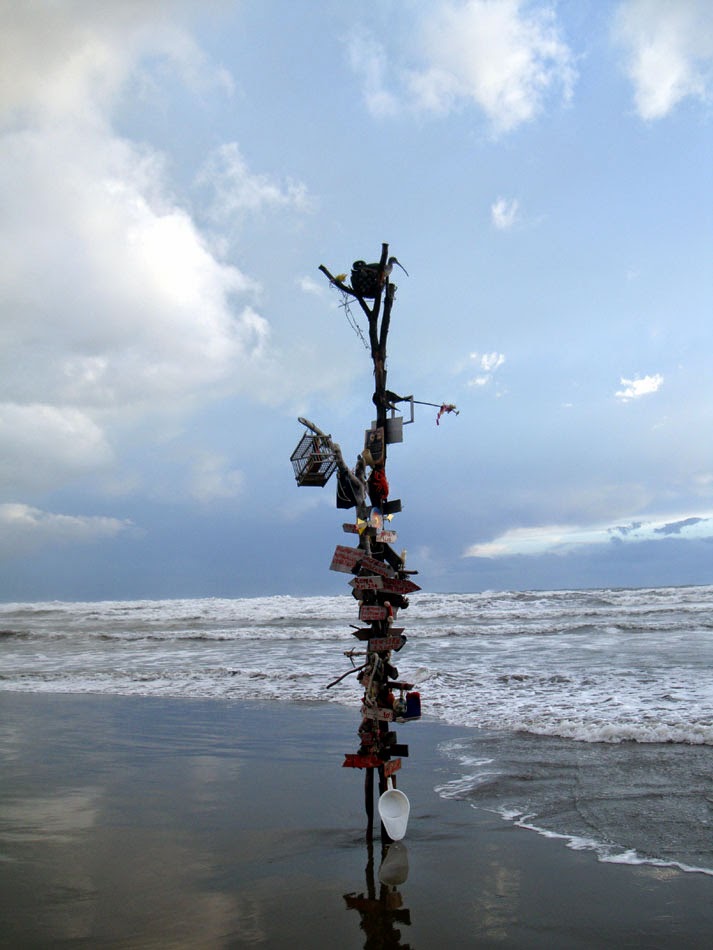Signposts in the Sea
Well, I’ve really lost the plot. I’m having a crazy week running round trying to do a thousand things before I leave for England on Saturday. I have lists and post-it notes everywhere. There are three, very different, book talks to write and a workshop to plan, the house to clean, a pile of ironing, garden to sort out and the fridge to fill for Himself (who will otherwise live on Tuscan sausages and fried eggs while I’m away). Then there are the two guest blogs I promised to write and the emails piling up in the mail box . . .
But I did play truant to have coffee with a friend yesterday and a walk along the beach. The weather has suddenly got warmer and the ‘bagnos’ are opening up. The beaches are no longer a wide, wild expanse of sand, but lined with coloured umbrellas, and they’re bulldozed clean every evening. The amount of rubbish the sea brings in is horrifying - a long tidemark of plastic and pieces of wood, fragments of fishing net - but mostly plastic.
Last time we were down here, someone had been very creative with the rubbish, erecting an ‘installation’ that had a very direct message. It's all made from objects found on the beach.
The Mediterranean is not in good health. A week ago we had an evening walk onto the ‘pontile’ and, when we reached the end of the pier and looked out to the horizon we realised that there were pale blue shapes in the water below us, like scattered flowers, floating in shoals as far as the eye could see and being washed ashore with every wave. We walked back and then down onto the beach to take a look. It was mussel shells, piling up on the sand in drifts that stretched for kilometers. Unfortunately I didn’t have my camera with me to record it. What killed the mussels - millions of them? We still have no idea, and no one else seemed very concerned. The beach cleaning forces are relentless in summer. By morning every last mussel shell had been cleared away.
But the message is clear - we can’t go on treating the planet like this. The signs are there for everyone to see.
But I did play truant to have coffee with a friend yesterday and a walk along the beach. The weather has suddenly got warmer and the ‘bagnos’ are opening up. The beaches are no longer a wide, wild expanse of sand, but lined with coloured umbrellas, and they’re bulldozed clean every evening. The amount of rubbish the sea brings in is horrifying - a long tidemark of plastic and pieces of wood, fragments of fishing net - but mostly plastic.
Last time we were down here, someone had been very creative with the rubbish, erecting an ‘installation’ that had a very direct message. It's all made from objects found on the beach.
The Mediterranean is not in good health. A week ago we had an evening walk onto the ‘pontile’ and, when we reached the end of the pier and looked out to the horizon we realised that there were pale blue shapes in the water below us, like scattered flowers, floating in shoals as far as the eye could see and being washed ashore with every wave. We walked back and then down onto the beach to take a look. It was mussel shells, piling up on the sand in drifts that stretched for kilometers. Unfortunately I didn’t have my camera with me to record it. What killed the mussels - millions of them? We still have no idea, and no one else seemed very concerned. The beach cleaning forces are relentless in summer. By morning every last mussel shell had been cleared away.
But the message is clear - we can’t go on treating the planet like this. The signs are there for everyone to see.






Sad. So many people going on like it is business as usual. When will the tipping point arrive as it surely must? That vast "gyre" of plastic in the North Pacific is a frightening indictment of our profligate waste.
ReplyDeleteI agree with you Ben. The more obvious it gets the more it seems that people turn their backs - governments particularly.
DeleteGood post, good images. I'm in a harbour just now that is littered with filth and plastic. Shocking, I might add. No one writes about this when mentioning Bali but there is a frightening side to these so-called resort areas of the world, too. Thanks for this post.
ReplyDelete